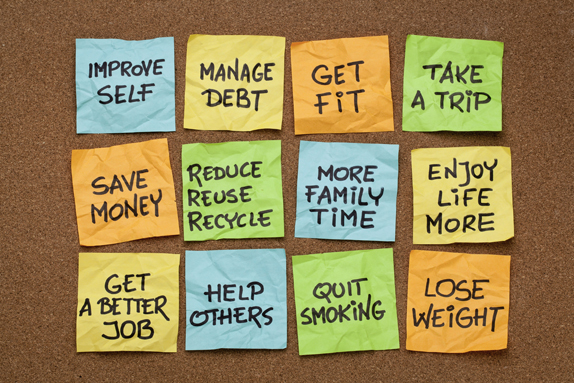The trouble with most New Year’s Resolutions is that they aren’t focused on something quantifiable and specific. Vague resolutions are very easy to break because it is never clear if you are actually achieving them or not. For example, with a resolution like “exercise more” you’ll never know if you actually did it or not. But a resolution like “do three pull-ups every night” is much more specific. There is no ambiguity about whether or not you did three pull-ups or not.
One of the best ways to track New Year’s Resolutions is to get a calendar where you can mark your progress each day. So for the pull-up example, you might put the calendar on the wall near your pull-up bar and put an X through each day that you achieve your goal. Try to keep your “streak” or “chain” going as long as possible. I’ve heard that Seinfeld used a method like this to make sure he never skipped a day of writing jokes.
In the spirit of New Year’s Resolutions, here are some suggestions of specific, actionable resolutions that you can track. Obviously these are just to give you some ideas–choose resolutions that are appropriate for you.
Exercise:
- Spend at least 10 minutes three times a week at your target heart rate.
- Go to the gym at least twice a week and commit to staying for at least 10 minutes.
- Do three push-ups and 20 sit-ups every night.
- Take the stairs at the office at least once per day.
Family:
- Call at least one family member each week that you haven’t spoken with for a month or longer.
- Organize a family video conference once each month. (Google+ lets you put up to 8 people on a video conference for free. Skype can handle up to 10 if one person has the Premium plan.)
- Send birthday cards to siblings and parents. If it is easier, you can do three months at once and just write the date where the stamp goes to help you remember when to send it.
- Start your Christmas shopping in January. Keep a list and make sure you put the presents somewhere you can find them again.
Work / Career:
- Read one business book per month.
- Subscribe to an industry magazine. Each month tear out the articles that interest you and carry them with you until you read them.
- Take one online college class that will make you better at your job and that can count toward a master’s degree in your field.
- Every week document the major contributions you made at work. Use these as part of your annual review.
- Each week contact someone from your network that you want to stay in touch with.
Finances:
- Organize, track and categorize your expenses every week. Look at using something like Mint, Wave Accounting or Expensify.
- Set up regular contributions to your retirement account. Make sure it happens automatically every pay period.
- Read at least two books on personal finance.
- Spend fifteen minutes each week learning more about taxes.
- Every month find a way to stop $5 of recurring expenses. Some examples: Downgrade cable. Switch to a more appropriate cell phone plan. Batch errands to save fuel.

I know it’s the end of January, but it’s not too late to start putting these into action right!? Thanks for the tips and examples – I’m going to have a think tonight about how to make realistic resolutions that will help make life a little less hectic!